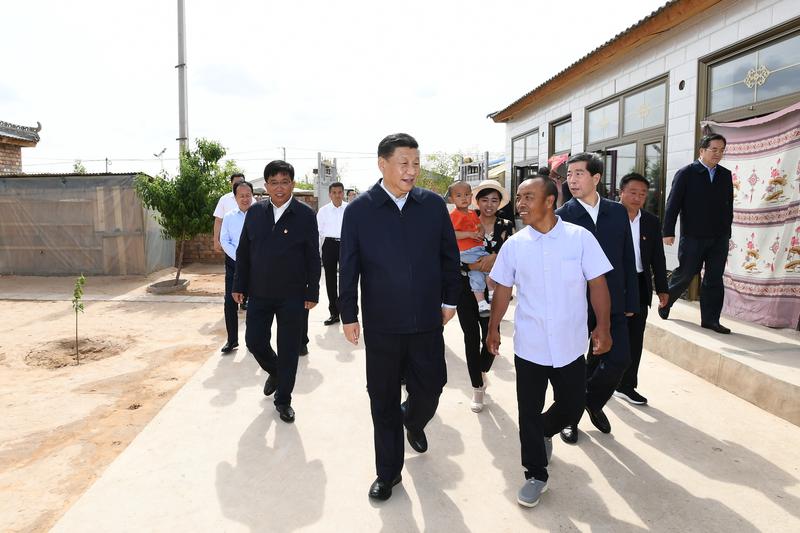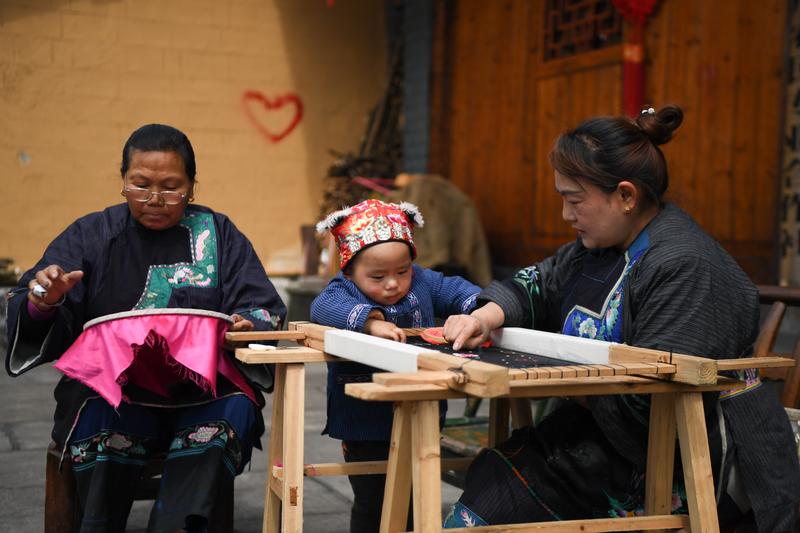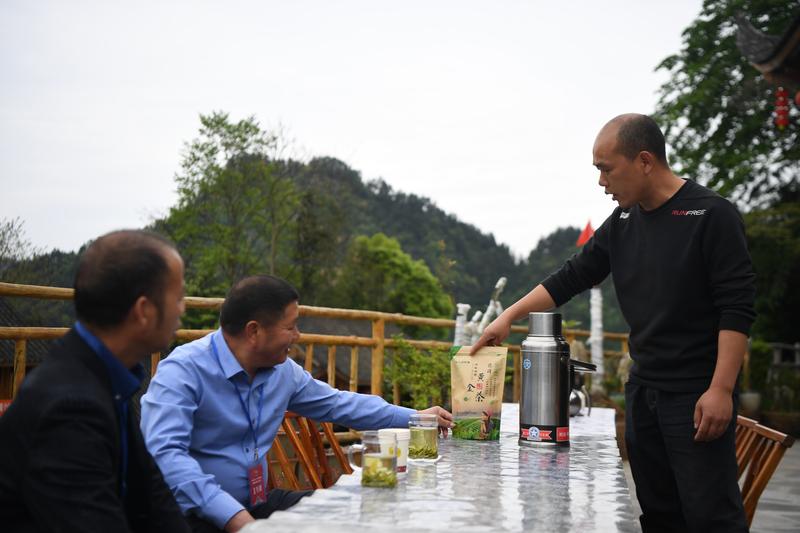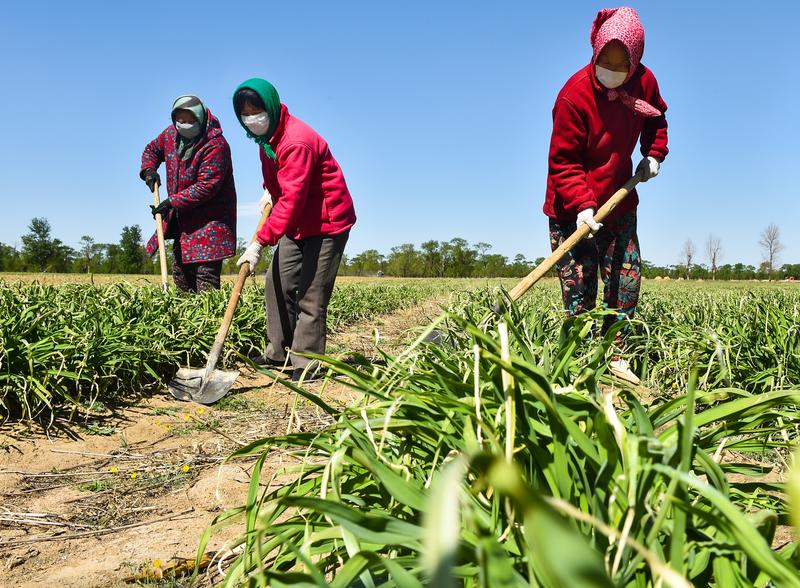



Six years ago, Hu Zhengnan decided to temporarily leave his office job at a geological survey institute. He signed up to join a poverty relief team headed to the countryside.
The 25-year-old cadre of the Communist Party of China (CPC) was sent to Liuquan, a village situated in a large resettled zone for people who moved out of uninhabitable mountains in northwest China's Ningxia Hui Autonomous Region. Most of the people there had lived hand to mouth for generations.
Hu was expected to use his vision and knowledge to help them change their fate.
After two years of research, Hu pinned his hope on an edible plant -- daylily. The plant is increasingly popular at the dinner table of city folks and should have a huge market, Hu told fellow villagers.
To their advantage, Liuquan's dry climate and wide diurnal temperature range are ideal for daylily farming.
But persuading farmers accustomed to growing wheat and corn to switch to this unassuming yellow flower was no easy task. And there was a lot of tutoring, infrastructure building, and marketing to do.
"Initially, farmers were afraid to make the change. The hardest part was to change their perception," Hu said.
Undeterred by the challenges, Hu devoted himself to the cause and stayed for four more years. Today, as the first secretary of Liuquan village committee of the CPC, Hu is happy to see the daylily farm expand to 267 hectares. All but nine households in the village bid farewell to poverty.
"The villagers no longer waited for government handouts. They have something to hope for and are very much inspired to work for a better future," he said.
Party leadership
Hu is among 2.9 million cadres the CPC mobilized and sent to poor villages in recent years. They form a crucial force battling China's poverty at the frontline.
The Party, founded in 1921, has led the Chinese in fighting and winning the revolution, establishing the people's republic and developing it into the world's second largest economy.
July 1 marks the CPC's 99th anniversary of founding. A year shy of the centenary, the Party is poised to achieve yet another milestone -- eradicating absolute poverty.
Xi Jinping, general secretary of the CPC Central Committee, leads the fight.

Chinese President Xi Jinping, also general secretary of the Communist Party of China Central Committee and chairman of the Central Military Commission, learns about efforts to advance poverty alleviation in Hongde Village of Wuzhong City, northwest China's Ningxia Hui Autonomous Region, June 8, 2020. [Photo/Xinhua]
As the sudden outbreak of COVID-19 brought extra challenges this year, Xi convened a large teleconference on poverty reduction in March and later inspected efforts on the ground when he visited Shaanxi, Shanxi, and Ningxia.
Xi said bringing all rural residents above the current poverty line by 2020 is a solemn promise made by the CPC Central Committee, and it must be fulfilled on time.
With less than 200 days left, the remaining pockets of deep poverty are the nation's most deprived and hardest to support, including some ethnic minority and border areas.
In Ningxia, Xi reiterated that no ethnic minority group should be left behind.
"The CPC started out as a party for the poor. The revolution was fought to liberate the poor. After the revolution was won, the Party should lead the people in living a better life," Xi said. "We managed to overcome all difficulties and challenges in the more than 70 years after the founding of New China because we remain true to our original aspiration and keep our mission firmly in mind."
Targeted poverty alleviation
From edges of deserts to deep inside the mountains, China has lifted more than 93 million people out of poverty in less than eight years.
Liu Yongfu, director of the State Council Leading Group Office of Poverty Alleviation and Development, said the intensity, scale, and impact of this round of poverty eradication are all unprecedented.
Behind the success is the well-implemented "targeted poverty alleviation" Xi put forward in November 2013, according to Liu.
The key is to identify the right population, tailor poverty-relief programs to local conditions, and send appropriate resources and personnel to implement the programs, he said.
The village of Shibadong in central China's Hunan Province may shed light on how targeted strategies work. It was there that the concept was first put forward.
While daylily is the cash crop in Liuquan, poverty relief cadres sent to Shibadong found luck in kiwi fruit.
Rich in natural beauty and scenic landscapes, Shibadong is hobbled by a rugged terrain and scarce arable land. With the help of the government and private sector, villagers rented a plantation in a nearby township to grow high-quality kiwis.
Having tasted the sweet success of kiwi farming, the village ventured into other businesses: it partnered a company to sell bottled mountain spring water and began to develop rural tourism. Unique landscapes and ethnic Miao culture are a big draw. Tourists brought business to hotels, restaurants, embroidery and honey farming.

Villagers make pieces of embroidery in a rural cooperative in Shibadong Village of Xiangxi Tujia and Miao Autonomous Prefecture, central China's Hunan Province, April 24, 2020. [Photo/Xinhua]
Shibadong is no longer poor. Last year, the average annual income of villagers reached 14,668 yuan (abut 2,100 U.S. dollars), more than eight times the figure in 2013.
Across the country, rural industries like the ones in Shibadong have helped many shake off poverty. Others have escaped poverty through relocation, ecological compensation, or education. Social security allowances were given to the sick, the disabled and others who could not work their way out of extreme poverty.
After the poverty reduction tasks are completed this year, the number of people lifted out of poverty since the 18th CPC National Congress is expected to top 100 million.

Villager Yang Zhengbang (R) introduces local tea products to tourists in Shibadong Village of Xiangxi Tujia and Miao Autonomous Prefecture, central China's Hunan Province, April 25, 2020. [Photo/Xinhua]
"There is no other country in the world that can help so many people get rid of poverty in such a short time. This means a lot to both China and the world," Xi said at the poverty reduction teleconference in March, adding that the unprecedented achievement demonstrates the political advantages of the CPC leadership and socialist system.
China's poverty reduction has drawn applause from home and abroad.
United Nations Secretary-General Antonio Guterres once commended it as the greatest poverty reduction accomplishment in history.
Robert Lawrence Kuhn, a U.S. expert on China, said China's poverty alleviation served as a good example for the world's other developing countries to draw experience from.
"When historians of the future write the chronicles of our times, a feature story may well be China's targeted poverty alleviation," he said.
Better life
Bai Gaoshan's family used to live in a Yaodong, a house built into the hardened earth common across the Loess Plateau in northern China. The farmland they worked was dry and barren, and their lives harder still.
Along with 400 other people, they were relocated to a specially built village in the township of Xiping, Shanxi Province.
Thanks to the government's support, Bai's son received professional training and got a new job as a welder, earning about 40,000 yuan a year.
Like Bai's family, more than 9.6 million poor people in China have been relocated away from uninhabitable areas over the past couple of years to places where they can get access to more job opportunities and better public services.
When living in Yaodong, Bai worried that his son would be too poor to marry. After moving out, his son got married and now has a son of his own. They are happy, he said.
"The Party is good. It does things that bring tangible benefits to the people," Bai said.

Farmers weed in the vegetable field in Xiping Township of Datong City, north China's Shanxi Province, May 11, 2020. [Photo/Xinhua]
Whether it is a new skill or relocation or a host of other projects scattered across all four corners of China, the CPC's poverty reduction campaign is all about improving people's life.
Ending rural poverty is considered a defining benchmark of attaining the goal of building a moderately prosperous society in all respects.
But that is not the end. The country will focus on rural vitalization to strive for an even better life for rural residents.
